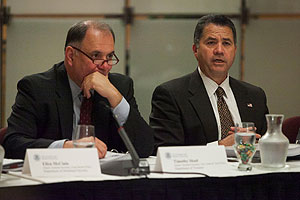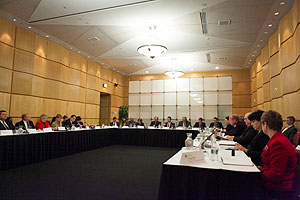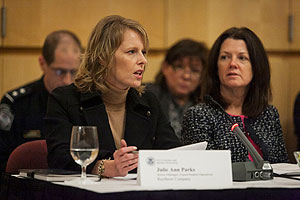|  |   |  Deputy Commissioner Aguilar Hosts Term-end Trade Advisory Committee
(12/06/2012) When members of the Advisory Committee on Commercial Operations of Customs and Border Protection, otherwise, known as COAC, gathered in Washington, D.C. on Tuesday for their last public meeting of the year, there was a great sense of accomplishment. Both COAC, comprised of 20 appointed members from the international trade community, and the government agencies that hosted the gathering acknowledged the significant progress that had been made. When members of the Advisory Committee on Commercial Operations of Customs and Border Protection, otherwise, known as COAC, gathered in Washington, D.C. on Tuesday for their last public meeting of the year, there was a great sense of accomplishment. Both COAC, comprised of 20 appointed members from the international trade community, and the government agencies that hosted the gathering acknowledged the significant progress that had been made.  |  | click for hi-res
 | | CBP Deputy Commissioner David Aguilar, right, and Deputy Assistant Treasury Secretary Timothy Skud preside over the last public gathering of the 12th term COAC on Dec. 4. |
| |
Photo Credit: James Tourtellotte |
|
|  |  |
“This has been a very active COAC. It has been very engaging, very dynamic, and we’ve had what I call healthy debates that have created momentum and kept us moving on a forward path,” said CBP Deputy Commissioner David V. Aguilar, who co-chaired the meeting.His counterpart at the proceedings, Timothy Skud, the deputy assistant secretary of tax, trade, and tariff policy for the U.S. Department of Treasury, concurred. “In my 20-plus years associated with this advisory committee, this has been the most productive COAC I’ve ever seen,” he said.Indeed, the 12th term committee has been busy. During the last two years, COAC’s members have made nearly 50 recommendations to CBP on how to improve the nation’s trade processes. “Some of the outcomes of these recommendations have resulted in initiatives that we can all be very proud of,” said Aguilar, citing the Centers of Excellence and Expertise and the simplified entry process as examples. “These are accomplishments that were brought forth by the thought processes and the engagement of the COAC with the trade community and CBP,” he said.The centers, which made their debut last year, are the heart of the sweeping changes the agency is currently undergoing to modernize its trade processing procedures. Operating on a national scale, the account-focused centers are the primary point of processing for participating importers within a specific industry. Currently, there are four active centers and six more that are scheduled to be opened during 2013. The simplified entry process was designed to reduce redundant paperwork requirements and adjust policies, procedures and technology that slow the trade process down and cause unnecessary delays with shipments or “entries.” Another accomplishment Aguilar noted was a benchmarking Trade Efficiency Survey, conducted by the COAC to measure how effective CBP’s trade facilitation efforts are at lowering the cost and burden associated with a company’s compliance and operation procedures. Among its findings, the survey revealed that a one-day delay in the release of merchandise costs companies more than $700 for each affected shipment. “We are now committed to doing this on a yearly basis,” said Aguilar. “It will give us insight as to what is happening and help us keep our finger on the pulse of the trade and CBP as we move forward.”Similarly, the COAC acknowledged CBP’s contributions. “CBP has worked with us in a process of co-creation to find new and innovative ways to facilitate trade flows and to increase economic competitiveness,” said Don Huber, global customs manager for the General Electric Co. and the committee’s chairperson.  |  | click for hi-res
 | | The COAC, an advisory committee established by Congress, is comprised of 20 appointed members from the international trade community. On Tuesday, committee members convened at the Ronald Reagan Building in Washington, D.C. |
| |
Photo Credit: James Tourtellotte |
|
|  |  |
The meeting included updates on trade programs and COAC subcommittee work. Among the topics discussed was the Automated Commercial Environment, or ACE, the agency’s cargo processing system. “We are very pleased to say that 100 percent of sea and rail manifests [that detail the contents of shipments] are now being filed in ACE,” said Brenda Smith, CBP’s acting executive director of the ACE Business Office. Smith also shared that the simplified entry cargo processing initiative, one of the ACE modules, was currently being tested at 16 of the largest airports around the country that handle air cargo. “We have also expanded the pilot from nine participants to 20. To date, more than 40,000 simplified entries have been filed in ACE,” said Smith, who added that progress has been made in working with other government agencies too. “We have the ability to feed actual live production data back and forth with a number of government agencies,” she said, “so the system is being used by other government agencies in real time.”The intellectual property rights, IPR, subcommittee gave an update on a new tool being used by CBP at the ports. “Based on feedback from a number of rights holders, CBP secured digital microscopes for use in some port locations to improve enforcement,” said Karen Kenney, a COAC member and the chief operating officer of Liberty International, a customs brokerage, freight forwarder and logistics company based in Rhode Island. “We have deployed 21 digital microscopes with cameras to capture magnified images that could not be taken with conventional cameras,” explained Therese Randazzo, CBP’s director of IPR policy and programs division, who partnered with Kenney on the subcommittee. “This will enable our officers to share suspect goods with right holders, other agencies and CBP laboratories to obtain information to help us determine whether or not goods are authentic or counterfeit and expedite the release of shipments that are authentic.”The COAC agricultural working group gave an update on CBP’s agricultural programs. Pests found in wood packaging material were one of the serious problems discussed. “We’ve had the regulation implemented for more than six years, but it still presents a challenge to us-- mostly associated with noncompliance,” said Kevin Harriger, the executive director of CBP’s agriculture programs and trade liaison. “For importers that means delays in international trade, remedial actions and refusal of entry. All of this is very costly, not withstanding the risk of another invasive species similar to the Asian longhorned beetle, which is right now in western Massachusetts. We just beat it back in Chicago, Ill., costing millions of dollars,” said Harriger. “Similarly, the emerald ash borer beetle has destroyed more than 70 million ash trees across the eastern United States.”To combat the problem, “an effective trade outreach program needs to be put in place so that importers, carriers, customs brokers and other logistics specialists are aware of the devastation that pests and diseases can cause when they gain even a tiny foothold in our country,” said Mary Ann Comstock, a COAC member who is the northern border compliance manager at UPS Supply Chain Solutions. The Air Cargo Security Subcommittee also made a recommendation to allow International Air Transport Association-approved freight forwarders to voluntarily transmit manifest data listing cargo contents in the ongoing Air Cargo Advance Screening pilot, known as ACAS. “ACAS is a really good example of pushing the borders out,” said Barbara Vatier, a COAC member who is the director of transportation and trade for Agilex, a technology consulting and software firm based in Virginia. “We’ve got to get the freight forwarders and the overseas agents involved in the process so that we can obtain data earlier,” she said.  | click for hi-res
 | | COAC member Julie Ann Parks, left, one of the principal architects of the committee’s Trade Efficiency Survey, talks about the survey’s findings while COAC member Karen Kenney listens. |
| |
Photo Credit: James Tourtellotte |
|
|  |  |
The ACAS pilot program, a joint effort with CBP, the Transportation Security Administration, and the air cargo community, was launched in December 2010 in response to a foiled terrorist plot in which explosive devices were planted within cargo shipments onboard aircraft bound for the U.S. The pilot program’s objective is to receive predeparture cargo data globally to allow CBP and TSA to conduct joint security risk analysis to identify potential threats to aviation. The COAC members voted and passed the recommendation.Other areas of discussion during the meeting included the role of the broker revision project, anti-dumping/countervailing duties, One U.S. Government at the Border, trusted trader partnerships, bonds, the National Strategy for Global Supply Chain Security, land border security initiatives, exports, and residue.For a number of COAC members, many of whom have served two successive two-year terms, this was their last meeting. New COAC members for the 13th term will be appointed and announced at a later date.COAC is a 20-member advisory committee that was established by Congress in 1987. The committee provides advice and recommendations to CBP and the Department of Treasury on the commercial operations of CBP and trade-related interdepartmental functions. Some of the issues that COAC focuses on include enhanced border and supply chain security, international efforts to harmonize customs practices and procedures, import safety, compliance, and modernization and automation processes used to facilitate trade.The next COAC meeting is scheduled to be held in February.  |
 |
|  |  |  |
|